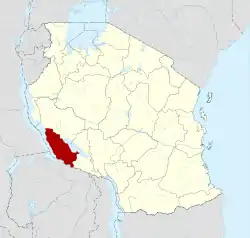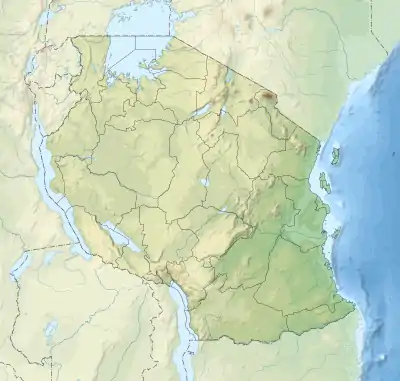Rukwa Region
Rukwa Region is one of Tanzania's 31 administrative regions with a postcode number 55000 . The regional capital is the municipality of Sumbawanga. According to the 2012 national census, the region had a population of 1,004,539.[2]:page 2 For 2002–2012, the region's 3.2 percent average annual population growth rate was tied for the third highest in the country.[2]:page 4 It was also the twentieth most densely populated region with 44 people per square kilometer.[2]:page 6
Rukwa Region
Mkoa wa Rukwa (Swahili) | |
|---|---|
 Sumbawanga Municipality | |
 Regional map before partition in 2012 | |
 Rukwa Region Location of Rukwa Region  Rukwa Region Rukwa Region (Africa) | |
| Coordinates: 7°00′S 31°30′E | |
| Country | Tanzania |
| Zone | Southern Highlands |
| Capital | Sumbawanga |
| Government | |
| • Regional Commissioner | Joackim Wangabo |
| Area | |
| • Total | 22,792 km2 (8,800 sq mi) |
| Population (2012) | |
| • Total | 1,004,539 |
| • Density | 44/km2 (110/sq mi) |
| Time zone | UTC+3 (EAT) |
| Postcode | 55xxx |
| Area code(s) | 025 |
| HDI (2018) | 0.467[1] low · 24th of 25 |
| Website | www |
The region is bordered to the north by the Katavi Region, to the east by the Mbeya Region, to the south by Zambia, and to the west by Lake Tanganyika, which forms a border between Tanzania and the Democratic Republic of the Congo.
History
The region's name comes from Lake Rukwa, which harbours the largest population of crocodiles in the nation. It is the region of the Fipa people, who maintain themselves by subsistence agriculture and livestock keeping.
The Rukwa Region was established in 1975 by President Julius Nyerere by taking Mpanda District from Tabora and the former unified Sumbawanga District from the Mbeya Region. Nkasi District was established in 1984.[3] In 2012, the region was reorganized with the Mpanda District going to the new Katavi Region.
Districts
The region is administratively divided into four councils (i.e. Sumbawanga Municipal Council (MC); Sumbawanga District Council; Kalambo District Council; and Nkasi District Council). Furthermore, RUkwa has two townships (i.e. Laela and Namanyere located in Sumbawanga and Nkasi districts respectively). Rukwa has 16 divisions, 97 wards, 339 villages, 1817 sub-villages/hamlets and 165 streets.
| Districts of Rukwa Region | |||
|---|---|---|---|
| District | Administrative Centre |
Population (2012 Census) | |
| Kalambo District | Matai | 207,700 | |
| Lyamba lya Mfipa District | Mtowisa | 162,557[4] | |
| Nkasi District | Namanyere | 281,200 | |
| Sumbawanga District | Sumbawanga | 353,082[4] | |
| Total | 1,004,539 | ||
Economy
Agriculture
Rukwa remains one of the biggest food producer in Tanzania. Its arable land suits the production of paddy, corn (maize), wheat, beans, and banana.
Mining
While there are extensive mineral resources in the Rukwa Region,[5] there are no active large mines. Gem stones, including emerald, moonstone, aquamarine, amethyst, ruby, and topaz, have been recovered from a number of locations.[5] There are coal seams in the Muze, Namwele, and Mkomolo areas, and some mining has occurred there.[5]
References
- "Sub-national HDI - Area Database - Global Data Lab". hdi.globaldatalab.org. Retrieved 2020-02-26.
- Population Distribution by Administrative Units, United Republic of Tanzania, 2013
- "Jamhuri ya Muungano wa Tanzania - Ofisi ya Waziri Mkuu - Tawala za Mikoa na Serikali za Mitaa: (The United Republic of Tanzania - Prime Minister's Office - Regional Administration and Local Government) Nkasi District - Introduction". Rukwa Regional Commissioner's Office. 2008.
- 2012 census included Lyamba lya Mfipa District in Sumbawanga District's total of 515,639. Siyame, Peti (30 April 2014). "Council approves division of S'wanga district". Daily News. Dar es Salaam, Tanzania. Archived from the original on 2 August 2014.
- "Jamhuri ya Muungano wa Tanzania - Ofisi ya Waziri Mkuu - Tawala za Mikoa na Serikali za Mitaa: (The United Republic of Tanzania - Prime Minister's Office - Regional Administration and Local Government) Natural Resources - Mining". Rukwa Regional Commissioner's Office. 2008.